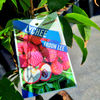In Stock
Price
$80
Order Place
157 Stonecutters Drive, Colebee, NSW-2761

Red ball Lychee ( Air layered Plants)
Red Ball Lychee ( Air layered Plants)

8 July 2025 at 12:51:24 am
Health Benefits of Lychee Fruit
1. Rich in Nutrients
Lychee is packed with essential vitamins and minerals, including vitamin C, vitamin B6, niacin, riboflavin, copper, potassium, and phosphorus.
2. High in Antioxidants
This fruit contains powerful antioxidants such as flavonoids, polyphenols, and vitamin C, which help combat oxidative stress and reduce inflammation in the body.
3. Supports Immune Health
Thanks to its high vitamin C content, lychee can boost the immune system, helping the body fend off infections and illnesses.
4. Aids Digestion
Lychee is a good source of dietary fiber, which promotes healthy digestion and can help prevent constipation.
5. Promotes Heart Health
The antioxidants in lychee can help lower blood pressure and improve overall heart health by reducing cholesterol levels and preventing blood clots.
6. Supports Skin Health
Lychee's vitamin C and antioxidants contribute to healthy skin by promoting collagen production and protecting against skin damage.
7. May Aid Weight Management
Low in calories and high in water content, lychee can be a satisfying snack that helps with weight management when included in a balanced diet.
8. Improves Bone Health
With minerals like copper and phosphorus, lychee can contribute to stronger bones and improved bone density.
9. Enhances Blood Circulation
The presence of copper in lychee aids in the production of red blood cells, which can enhance blood circulation and prevent anemia.
10. May Have Anti-Cancer Properties
Some studies suggest that the antioxidants in lychee may help inhibit the growth of cancer cells, although more research is needed in this area.
Conclusion
Incorporating lychee into your diet can provide numerous health benefits due to its rich nutrient profile and antioxidant properties. Enjoy it fresh, in smoothies, or as part of a fruit salad for a delicious and healthy treat.
Care and Maintenance of Lychee
1. Soil Requirements
Lychee trees prefer well-drained, sandy loam soil with a pH level between 5.5 and 7.0. It's important to ensure that the soil retains moisture but does not become waterlogged.
2. Watering
Regular watering is essential, especially during dry spells. Young trees should be watered deeply once a week, while established trees may require less frequent watering. Avoid overwatering to prevent root rot.
3. Fertilization
Apply a balanced fertilizer during the growing season. A formula high in potassium can promote healthy fruit development. Fertilizing should be done in early spring and again in late summer.
4. Pruning
Prune lychee trees to remove dead or diseased branches and to shape the tree. This should be done after the fruiting season. Proper pruning enhances air circulation and sunlight penetration.
5. Pest and Disease Management
Pests: Watch for common pests such as aphids, scale, and fruit flies. Use organic insecticides or neem oil as needed.
Diseases: Fungal diseases can affect lychee trees. Ensure good air circulation and avoid overhead watering to minimize the risk.
6. Harvesting
Lychee fruits are typically ready for harvest when they turn a bright red color and are slightly soft to the touch. Harvest carefully to avoid damaging the branches.
7. Winter Care
In cooler climates, protect lychee trees from frost by covering them or moving potted trees indoors. Mulching around the base can also help retain soil warmth.
8. Additional Tips
Ensure adequate sunlight exposure, as lychee trees thrive in full sun.
Consider planting multiple trees for better pollination and fruit yield.
By following these care and maintenance guidelines, you can ensure a healthy lychee tree that produces delicious fruit.









